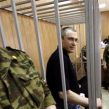
PUBLIC SENTIMENT TURNS TOWARD KHODORKOVSKY, WHILE PUTIN GRAPPLES WITH BLACKOUT
Publication: Eurasia Daily Monitor Volume: 2 Issue: 104
By:

On May 16, a Russian court began reading the verdict in the trial of Mikhail Khodorkovsky, owner of the destroyed oil giant Yukos, and his partner, Platon Lebedev.
By the end of the first week of reading the 1,000-page verdict aloud, a different issue had overtaken the “guilty-or-not” question: Was this unbelievably dull show really necessary? Now, as the reading drags through a second full week, the comments in the Russian media — and coverage still remains widespread — boil down to a very basic point: Does it make any sense at all? It is clearly impossible to compensate for the weakness of the evidence in the case by including every bit of it in the verdict, and the lawyers will enjoy ripping this text apart when preparing the appeal (Rosbalt, May 23). It is also impossible to expect that media would become so fed up with the endless proceedings that the final word would somehow go unnoticed. The gradual but unmistakable shift of public opinion in favor of the victims of the merciless persecution cannot be reversed by the sheer physical weight of the verdict (Kommersant-Vlast, May 23).
Since the Kremlin officials described this process as a “show trial,” it is possible to assume that an elaborate combination of public relations techniques drives the performance, perhaps hoping that the ponderous reading will reduce interest in the trial. But in fact, the emotional atmosphere around the courtroom has visibly changed from hopes and fears to ironic estrangement, and Putin’s inner circle simply cannot tolerate irony (Vedomosti, May 23; Globalrus.ru, May 24).
These generally undistinguished middle-aged men with backgrounds in the special services desperately want to be taken seriously — but they cannot demonstrate either the brutal determination of Stalin’s lackeys or the shrewd efficiency of the Yeltsin-era “oligarchs” whom they see as “class enemies.” It is, however, increasingly difficult to take them seriously. They decided to put the government on a shorter leash through “administrative reform” — and have created a dysfunctional bureaucratic mess instead (Novaya gazeta, May 23). They cannot even find a way to take meaningful control over the assets confiscated from Yukos and resolve the embarrassing quarrel between Gazprom and Rosneft (Vedomosti, May 19).
The long-awaited trial that has acquired a distinct Kafkaesque character is yet another product of this muddled and confused leadership (Polit.ru, May 23). Hence the grossly exaggerated concerns about security, with some 500 militia and riot-control OMON troops cordoning the area (Kommersant, May 25). The authorities, apparently, are prepared for massive protests accompanied by terrorist attacks, but what was really remarkable about the small — hardly a thousand strong — rally last Monday was its cheerful character, so closely resembling the revolutionary joy on the main square in Kyiv during the Orange Revolution (Polit.ru, May 24). The demonstrators were not expressing their anger over the ongoing blatant distortion of justice but making fun of the pathetic inefficiency of Putin’s siloviki, and they obviously had no clue how to treat this security challenge. The street where the Meshchansky court monotonously reads the endless text is now completely blocked due to emergency “road work.”
In many ways, the political situation in Russia now resembles the energy-supply system for Moscow, which involves a tremendous amount of generators and distribution networks, many of which have not seen proper maintenance for the last quarter of century. Last Wednesday (May 25), a minor short-circuit on a minor power station triggered a chain reaction of overloads and accidents resulting in a complete loss of power in most areas of the huge megalopolis. Technological disasters of this sort happen everywhere, but Russia, with its dilapidated infrastructure and rigid over-centralized management, seems particularly prone to the uncontrollable snowballing of a small accident (Gazeta.ru, May 26). As far as political stability is concerned, it is not the far-away elections that the Kremlin worries about — it is the many small, uncontrollable events that could trigger a landslide. Perhaps the drivers in the colossal traffic jams caused by the daily movements of Putin’s convoy will become so angry that their honking horns become a din of protest? Maybe students will stage a series of protests against the prospect of being drafted into the army? Big politics has been taken under firm control, but small politics may take revenge (Gazeta.ru, May 23).
In the quietest corner of Moscow’s hectic life, in the unseasonably hot May, sits a man who patiently listens to the long inventory of his crimes. His guilt is beyond doubt: he is guilty of not taking the sage advice to flee the unfriendly country at the right moment, of not chickening out when the going got tough, of not cracking and giving up during the year-and-a-half imprisonment before this torture-by-verdict-reading. He knows that the prosecution is preparing another case against him and that he is perceived as too dangerous to be set free in any foreseeable future. But now and again a small smile lights his face. Mikhail Khodorkovsky obviously knows something about the future that the authorities are not able to foresee.




